Just like a seasoned sailor navigating through turbulent waters, senior Poodles encounter health challenges that require careful attention and proactive management. From joint issues to cognitive decline, the well-being of your aging Poodle demands a tailored approach. Unravel effective strategies to address these common health hurdles and discover practical solutions to enhance the quality of life for your furry companion.
Key Takeaways
- Address arthritis with joint supplements, weight management, and regular exercise.
- Combat cognitive dysfunction with environmental enrichment and brain-boosting nutrients.
- Prioritize dental care to prevent periodontal disease and maintain oral health.
- Optimize nutrition with senior-specific food, hydration, and tailored supplements.
Common Senior Poodle Health Challenges
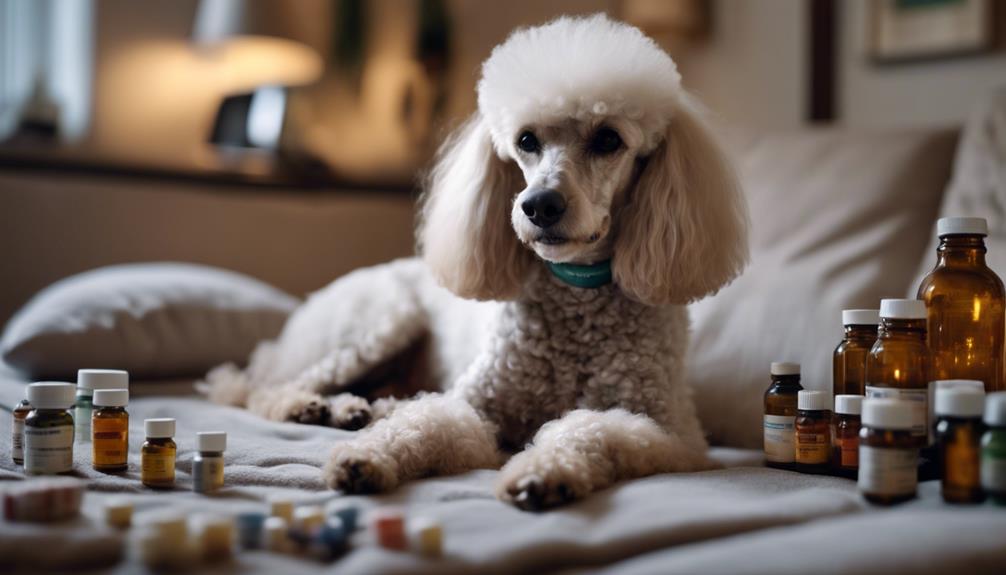
When caring for senior Poodles, you will inevitably encounter common health challenges that require attention and proactive management to ensure your furry companion's well-being. As Poodles age, they are prone to various health issues such as arthritis, dental problems, cognitive dysfunction, and behavioral changes. Arthritis, a prevalent concern in aging Poodles, can impact their mobility and overall comfort. Dental care becomes crucial to prevent dental diseases and maintain their overall health. Cognitive dysfunction may manifest in aging Poodles, leading to behavioral changes and confusion. It is essential to schedule regular vet check-ups to monitor and address any age-related health issues promptly. Additionally, as Poodles grow older, their nutrition requirements change, necessitating adjustments in their diet to meet their specific needs. Understanding these common health challenges and catering to the specific needs of aging Poodles can help ensure they lead comfortable and healthy lives.
Managing Poodle Arthritis
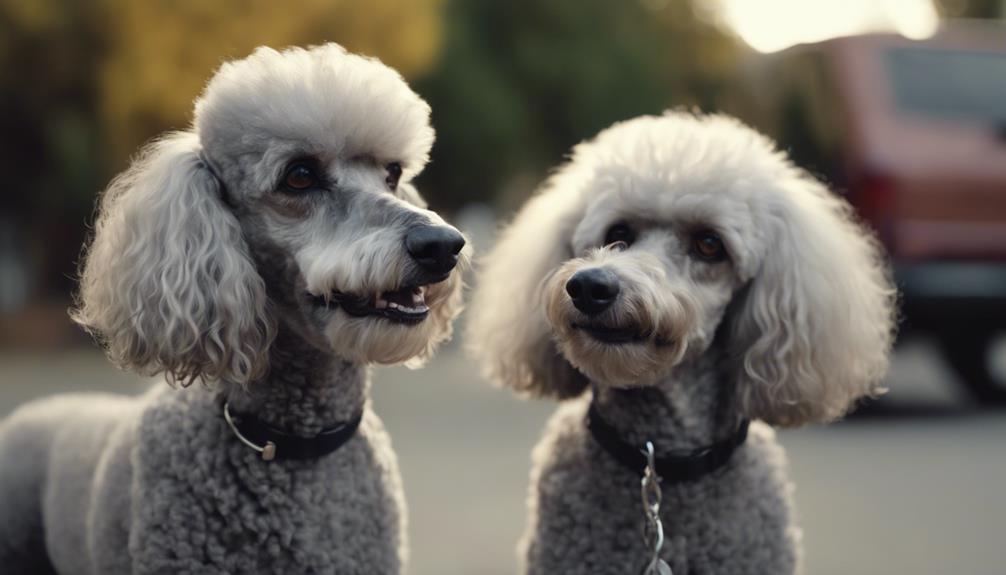
To effectively manage Poodle arthritis, it is essential to implement a holistic approach that addresses both physical comfort and mobility. Senior Poodles often face discomfort, stiffness, and limping due to arthritis, impacting their quality of life. Incorporating joint supplements, maintaining proper weight through diet control, and engaging in suitable exercise routines can help alleviate symptoms and improve mobility. Regular vet check-ups are vital for monitoring the progression of arthritis and adjusting treatment as needed. Providing comfortable bedding and ramps can assist senior Poodles in moving around more easily. By focusing on these management strategies, you can help your senior Poodle navigate arthritis with more ease and enhance their overall well-being.
| Strategy | Description | Benefits |
|---|---|---|
| Joint Supplements | Support joint health and reduce inflammation | Improve joint function and reduce pain |
| Weight Management | Control weight to reduce pressure on joints | Lessen strain on joints and improve mobility |
| Exercise | Engage in low-impact activities to maintain muscle strength | Enhance flexibility and overall well-being |
| Vet Check-ups | Regular monitoring and adjustments to treatment plans | Early detection and management of arthritis |
| Quality of Life | Provide comfort aids and assistance for better daily living | Enhance overall happiness and mobility |
Cognitive Dysfunction in Senior Poodles
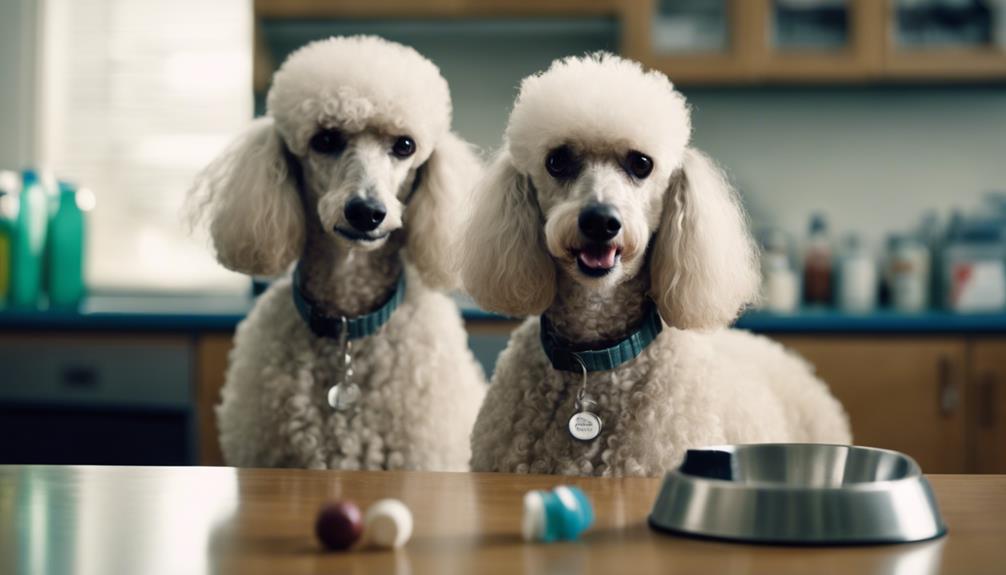
As senior Poodles navigate the challenges of cognitive dysfunction, it's crucial to understand the similarities between canine cognitive dysfunction (CCD) and Alzheimer's disease in humans. Signs of cognitive dysfunction in senior Poodles may manifest through disorientation, alterations in sleep patterns, and changes in interactions with their human family. Research indicates that a significant percentage of older dogs show signs of cognitive dysfunction, with over 28% of those aged 11-12 and a staggering 68% of those aged 15-16 exhibiting these symptoms.
To support cognitive health in senior Poodles experiencing cognitive dysfunction, environmental enrichment plays a vital role. Interactive toys, puzzles, and activities can help stimulate their minds and slow down cognitive decline. Additionally, incorporating dietary supplements rich in omega-3 fatty acids and antioxidants may aid in supporting brain health and cognitive function in senior Poodles. By providing a supportive and engaging environment, you can help your senior Poodle navigate the challenges of cognitive dysfunction with more comfort and ease.
Dental Care for Aging Poodles
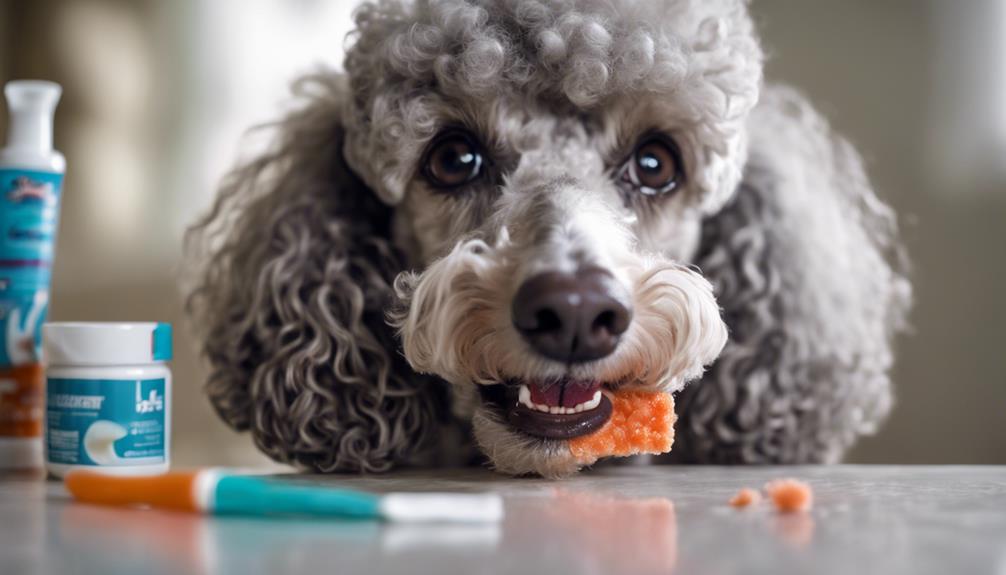
Maintaining proper dental care for your aging Poodle is essential to prevent dental issues such as periodontal disease and tooth decay. As senior Poodles age, they become more prone to problems like tartar buildup and gingivitis, impacting their oral health. Regular dental check-ups and cleanings play a vital role in safeguarding your Poodle's teeth and gums. Neglecting dental hygiene can lead to pain, infections, and difficulties with eating for senior Poodles. To combat these issues, make sure to brush your Poodle's teeth frequently and offer dental chews as preventive measures. By prioritizing dental care, you can enhance your Poodle's quality of life and ensure their overall well-being. Remember, a healthy mouth contributes to a happier and more comfortable life for your beloved aging companion. So, schedule those dental check-ups and embrace good dental hygiene practices to keep your senior Poodle smiling and healthy.
Nutrition Tips for Senior Poodles
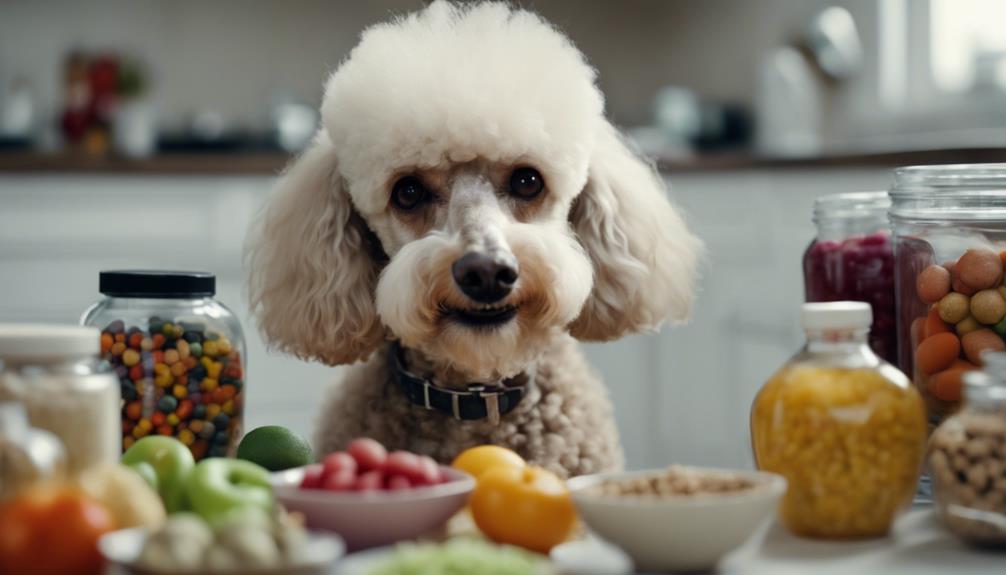
For optimal health in your senior Poodle, ensuring they receive high-quality, senior-specific dog food is essential. Senior Poodles have changing nutritional needs, and providing them with the right balance of nutrients is crucial for their overall well-being. Adequate hydration is also key to support their health and prevent dehydration. Additionally, supplements such as glucosamine can be beneficial for older Poodles in managing joint health and mobility. To help your senior Poodle maintain a healthy weight and prevent obesity, portion control is important. Consulting a veterinarian for a diet tailored to your senior Poodle's specific requirements is advisable for their optimal health.
| Nutrition Tips for Senior Poodles | ||
|---|---|---|
| Ensure high-quality, senior-specific dog food | Adequate hydration | Consider supplements like glucosamine |
| Portion control for weight management | Consult a veterinarian for tailored diet | Maintain joint health and mobility |
Frequently Asked Questions
What Is the Most Common Cause of Death in Poodles?
Heart disease, kidney failure, cancer risk, and other health challenges contribute to Poodles' mortality. Regular check-ups, early detection, and preventive care are crucial. Addressing these issues promptly can help prolong Poodles' lives and improve their well-being.
What Is the Most Common Disease in Poodles?
Hip dysplasia is the most common disease in Poodles. It can affect their mobility and quality of life. Regular vet check-ups, a balanced diet, and proper exercise can help manage this condition and keep your Poodle healthy.
At What Age Is a Poodle Considered Old?
As a poodle gets older, signs of aging like slower movements and behavior changes may appear. Tailoring their care with adjusted exercise, proper nutrition, and comfy bedding can help manage the aging process effectively.
What Happens to Poodles as They Get Older?
As Poodles age, they may experience joint pain, weight changes, dental issues, cognitive decline, altered exercise needs, nutritional adjustments, skin problems, mobility concerns, the need for regular checkups, and increased mental stimulation to support their well-being.
Conclusion
In conclusion, caring for your senior Poodle's health requires attention to their specific needs. Regular vet check-ups, proper nutrition, and supplements like glucosamine can help manage common issues such as arthritis and cognitive dysfunction. Remember, your furry companion relies on you to provide the best care as they age. So, stay informed, stay proactive, and give your senior Poodle the love and support they deserve. After all, they're not just pets, they're family.
